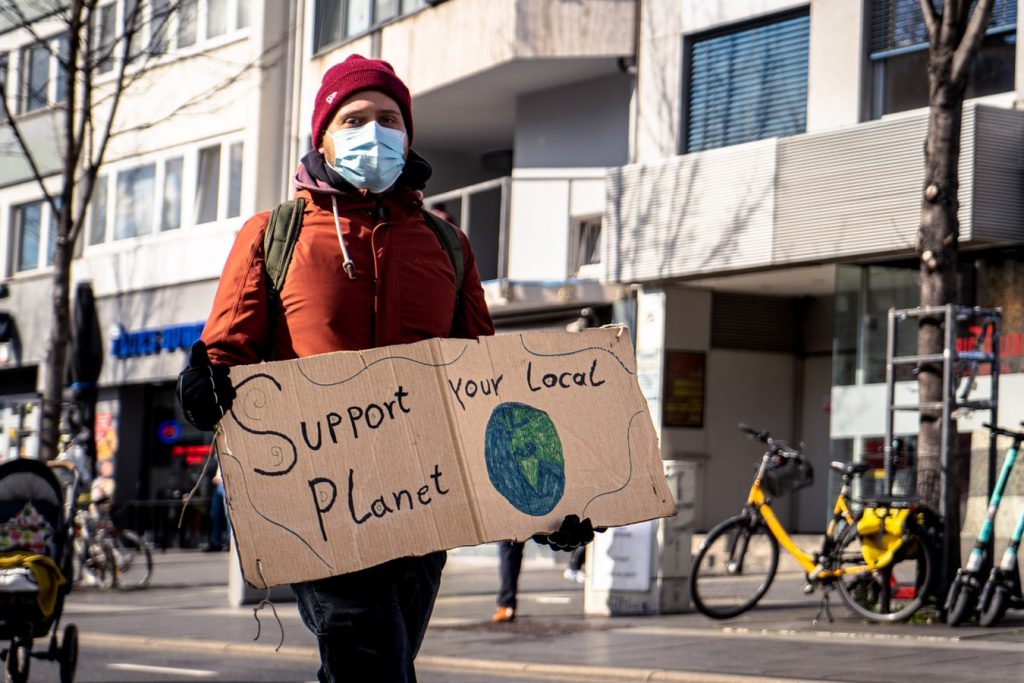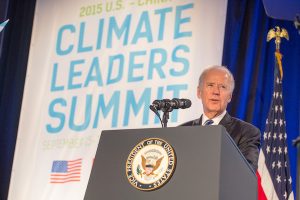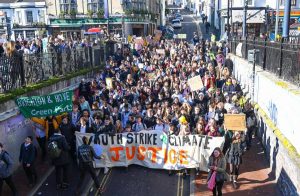
Coronavirus and the Climate Crisis: How one disaster could stop the other
by Martin Greenwood | Apr 26, 2021 | Climate change and sustainable development | 0 comments
Image: https://unsplash.com/@mbaumi
By Maisie Outhart
With Trump on his way out of office and economic revival at the forefront of policy, society has an unprecedented opportunity to mitigate or even put an end to the climate crisis.
The call for environmental sustainability is not new, and in fact the increasing urgency in campaigning puts into perspective how severe the situation has become when you consider the length at which it has been discussed. However, momentum behind the climate social movement has somewhat dissipated during the pandemic, with Glen Peters, Research director at the Center for International Climate Research, saying: “it’s going to put a pause on anything climate related,” as discussions will focus on economic recovery and coronavirus. To me this seems defeatist, because whilst climate change is not new, coronavirus has taught us that when people are at risk, change can happen quickly. This, and the future formulation of recovery plans on a scale never seen before, coupled with the fact that the US President-elect supports the Green New Deal frameworks , could stop the climate crisis.
Joe Biden’s climate policies, including a target to reach net zero emissions by 2050, would reduce US emissions to such a great extent that the world could avoid a 0.1c temperature rise by 2100, according to Climate Action tracker. During his campaign for presidency, he said he would invest $2 trillion in areas such as clean energy, infrastructure, and transit as part of his economic recovery plan, a clear example of how economic recovery plans can also work towards sustainability and against the climate crisis. However, these policy proposals are quite optimistic considering the Republicans currently have the edge to keep the Senate and the Supreme Court is now heavily conservative. Biden will likely have to adjust his environmental proposals to get them through a divided Congress, as some Americans may see them as “radical,” similarly to how Obama struggled to pass his Obamacare legislation.

Joe Biden at the Climate Leaders’ Summit in 2015. (Official White House Photo by David Lienemann https://joebiden.com/climate-plan/)
This is where the pandemic can help solve the climate crisis. It has been proved people are willing to make changes to their everyday lives, and politicians willing to change laws, when there is great risk to human life, then this logic can be applied to environmental policies as well. It has to be said that despite Trump’s aversion to coronavirus restrictions, not all Republicans are Trumpist. The threat to human life climate change poses must be emphasised in order to influence the decisions of policy makers, and this can be applied globally.
The UK must take a similar approach. Rishi Sunak’s “green industrial revolution”, with plans to increase the government’s clean energy investment heavily contradicts the £27 billion investment to expand the UK’s road networks, which will entrench the UK into more years of carbon reliance. This money could be better spent on cycle infrastructure and public transport, which also creates long-lasting and environmentally conscious jobs. These types of policies would tackle rising unemployment in the wake of the pandemic and help to prevent climate change. Investments in clean energy are only valuable to a certain extent when you consider that societies can consume less energy (as seen as a result of lockdown) which means less energy infrastructure is needed.
So how do we make sure the UK government’s recovery plan works towards stopping the climate crisis as well as lessening the socio-economic impacts of the pandemic? One way would be public momentum, which has been effective on the government during their handling of coronavirus. For example, Marcus Rashford’s campaign on free school meals gained so much support that the government made a U-turn on their policy to stop them over half term.

A YouthStrike4Climate demonstration in Brighton, February 2020, accessed via https://actionnetwork.org/petitions/officially-endorse-the-youth-strike-4-climate/
Perhaps if the public were better informed of the risks to their lives as a result of climate change, and climate injustice, there may be grounds for an effective social movement, one that was gaining significance through YouthStrike4Climate and Extinction Rebellion before the pandemic. Again, however, the pandemic has arguably made this tactic more effective on the government because it has proved that fast change is possible and there is mandate to enforce it when there is threat to human life.
On a global scale, if Biden’s pledges became successful policies, 50% of global carbon emissions have a pledge of reaching net zero emissions by 2050, with Japan, South Korea, and the EU also making their own pledges. The recovery from coronavirus could therefore mark a historic turning point, both economically and environmentally, as countries develop plans alongside significant environmental pledges.
Recent Posts
Recent Comments
- k on Two Busy Days Polluting and Killing
- Why ‘Green Consumerism’ is not the Solution? | Cities Explained on How Neoliberalism Destroyed the Planet and Why Capitalism Won’t Save Us
- Hope on Holiday Hunger: The starving children of Britain
- https://kernyusa.estranky.sk/clanky/risk-factors-linked-to-anxiety-disorders-differ-between-women-and-men-during-the-pandemic.html on Social media as the new leadership in social movements: The Egyptian Revolution
- UK Trip on The impossible barrier: Would you fail the ‘Life in the UK’ test?
Archives
Contact us
+44 (0) 161 306 6000

0 Comments